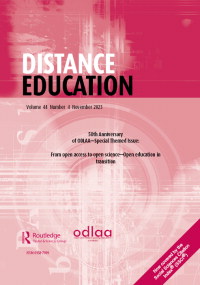我们接近了吗?辩论科学中的开放性悖论
IF 3.7
1区 教育学
Q1 EDUCATION & EDUCATIONAL RESEARCH
引用次数: 0
摘要
在这篇理论和概念文章中,我们提出将卢曼的社会学系统理论作为一种差异理论方法应用于科学的开放性,揭示了一个开放性悖论。我们描述和讨论了教科文组织目前提出的开放科学的一般概念,并假设只有通过接受科学方法真正和本质上是开放的,高等教育机构和科学才能真正被认为是开放的。通过系统理论分析和发现相关系统的功能和科学内部的各种结构(例如,出版和资助)似乎注定是并最终保持封闭的,从而产生了悖论。最后,我们提出了一个开放科学的理想方案,可以在未来消除开放悖论,并一劳永逸地回答“我们接近(d)吗?”这个问题。关键词:系统理论科学方法开放科学开放教育去中心化科学开放性公开声明作者未声明存在潜在的利益冲突。本杰明·启发式(benjamin Heurich)本杰明·启发式(benjamin Heurich)是应用bbb研究所的研究员,专注于媒体教育、数字素养、社会学和社会哲学。他倡导开放科学和普遍结构,以促进超越民族国家的全球教育和正义。本斯LukácsBence Lukács是应用b区块链研究所的研究员,通过开放和社会科学的视角研究媒体教学、数字化转型和组织发展。他的主要研究领域是分散式教育和开放科学。本文章由计算机程序翻译,如有差异,请以英文原文为准。
Are we close(d)? Debating the openness paradox in science
AbstractIn our theoretical and conceptual article, we propose that the application of Niklas Luhmann’s sociological systems theory as a difference-theoretical approach to the opening of science unveils an openness paradox. We describe and discuss the general concept of open science as currently proposed by UNESCO and posit that only by accepting the scientific method as truly and inherently open, can higher education institutions and science at large indeed be considered open. The paradox arises by analyzing and discovering through systems theory how the relevant systems function and the various structures within science (e.g., publishing and funding) are seemingly destined to be and ultimately stay closed. Finally, we propose a desideratum for open science that could dissipate the openness paradox in the future and once and for all answer the question “Are we close(d)?”.Keywords: systems theoryscientific methodopen scienceopen educationdecentralized scienceopenness Disclosure statementNo potential conflict of interest was declared by the author(s).Additional informationNotes on contributorsBenjamin HeurichBenjamin Heurich is a researcher at the Institute for Applied Blockchain with a focus on media education, digital literacy, sociology, and social philosophy. He advocates for open science and universal structures to promote global education and justice beyond nation states.Bence LukácsBence Lukács is a researcher at the Institute for Applied Blockchain and has worked on media didactics, digital transformation, and organizational development through the lens of openness and social sciences. His main research centers around decentralized education and open science.
求助全文
通过发布文献求助,成功后即可免费获取论文全文。
去求助
来源期刊

Distance Education
EDUCATION & EDUCATIONAL RESEARCH-
CiteScore
10.70
自引率
6.80%
发文量
29
期刊介绍:
Distance Education, a peer-reviewed journal affiliated with the Open and Distance Learning Association of Australia, Inc., is dedicated to publishing research and scholarly content in the realm of open, distance, and flexible education. Focusing on the freedom of learners from constraints in time, pace, and place of study, the journal has been a pioneering source in these educational domains. It continues to contribute original and scholarly work, playing a crucial role in advancing knowledge and practice in open and distance learning.
 求助内容:
求助内容: 应助结果提醒方式:
应助结果提醒方式:


